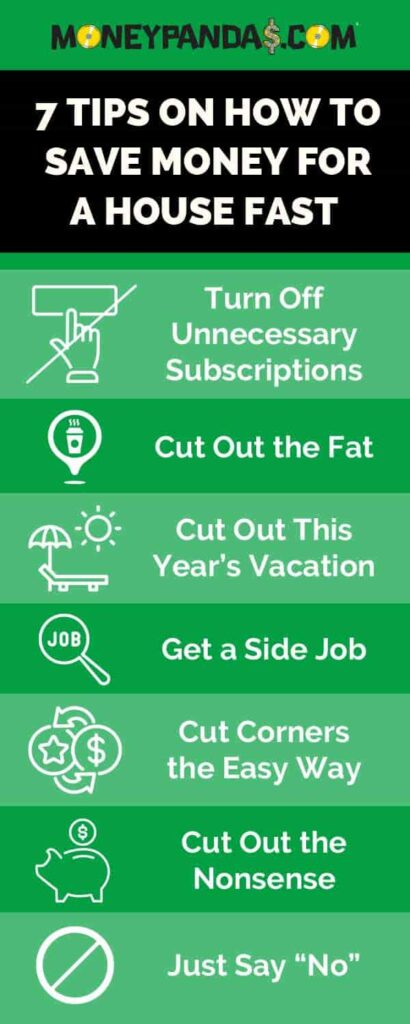7 Tips on How to Save Money for a House Fast
You have been casually looking into purchasing a home. Yes, you are aware that this is probably the most significant investment in your life. But were you REALLY prepared to see the bottom line as to just how much your dream home is going to cost? Probably not.
While you may have not even started saving to buy a home, strategies can be put in place to quickly save money to purchase the house where you already see yourself raising your children and grandchildren.
What is the Fastest Way to Save Money for a House?
While there are many vetted, tried, and true ways to save money for a house, probably the most obvious and slightest thought about a way to go about putting back those pennies is to trim the fat out of your budget.
Benjamin Franklin was very accurate with his affirmational warning. “Beware –little expenses; a small leak will sink a great ship,” and real estate experts agree with this statement.
Real estate expert Zakiyyah Gomez says, “The fastest way is to be disciplined and eliminate any extra spending habits that aren’t a necessity. Use that money you would normally use for eating out, movies, entertainment, etc., and SAVE IT… you [will] have your down payment in no time. It is a temporary change for a promising future.”
How Much Money Should You Save for a House?
This question is not as simple to answer as you might think. While a 20% down payment seems to be “standard,” there are many exceptions to this rule.
- How Much Do You Want Your Monthly House Payments to Be? – Sometimes 20% is what your lender requires, but is that 20% going to put your house payments in a range where you can easily make them each month. If not, you may need to plan on saving more than 20%.
- What Type of a Loan Will You Be Acquiring? – There are loans out there that can require as little as a 3% down payment to qualify.
There are even particular loans through entities such as the VA that don’t require a down payment at all.
In some instances, you can accept a one-time gift from your parents as a down payment, not requiring you to come up with a down payment at all.
Where Should I Save Money to Save for a House?
When it comes time to start saving money for your new home, you have to decide where to keep that money. You want to make sure that it is in a safe place where it will not be easily accessible so you won’t be tempted to use it, and it should be somewhere earning interest while you wait for it.
The site Money Under 30 offers some excellent advice on where you should place your money while saving for a house.
- High-Yield Savings Account – While a traditional savings account will garner anywhere from 0% to a bit higher in interest, a high-yield account can earn in the general vicinity of 2% interest.
Thousands or even tens of thousands of dollars over several-year periods can add up nicely, allowing you to reach your home down payment savings goal faster than you initially thought possible.
- CDs – If you require holding on to a relatively large amount of money that you do not want to be able to have access to, and you always want to make sure you are earning a decent amount of interest on your money, a CD could be the way to go for you.
- Investing – While this is riskier with your money, it can also have a great payoff. Investing in the stock market comes with risks, as you never know when a stock will hold its value.
- Your Retirement Fund – Frequently, many retirement funds will allow you to make a withdraw from your funds to use as a down payment on a home. Not only will they let you do that, but they also will not charge interest to do so.
What Is the 30-Day Rule?
How much should you have in your savings account as a general rule? It’s recommended that you have enough savings to cover six months of expenses at the minimum. This is to account for any sudden emergencies that may spring up and gives you a solid foundation for you to stay secure.
Obviously, the situation for every individual is different depending on where they live and what their expenses are, but with a fund held securely, you can prepare for any situation until your income and expenses stabilize again. Having this much saved can help you retire on time, or in the case of emergencies popping up, have something to fall back on.
Any kind of saving is a good saving, especially in the long term. We can’t predict how things like inflation or product prices will affect us in the future, but we can be prepared by holding on to as much savings as possible.
At the end of the day, there are lots of ways that you can utilize to help you budget better and spend less money overall. The more you save, the more you’ll be grateful to yourself later on when it’s time for that money to be put to use.
What Is the 30 Day Rule?
When you are accustomed to spending money as you wish, developing impulse control when blowing through your money is an issue that many of us deal with, or rather, just DON’T deal with.
Adhering to, or at the very least, making an effort to practice impulse control when it comes to spending money can be a tricky business if you are addicted to shopping, but it CAN be done.
To put it very basically, the 30-Day Rule helps people to be TRULY able to distinguish between a WANT and a NEED. Let’s say you want to make a purchase. The 30-Day Rule states that you must put that purchase on hold for 30 days. If, after that time, you feel you still need to make the purchase, then go ahead.
If, after 30-Days, that purchase is no longer necessary, you now have that money to use towards the down payment of your new home.
The 30-Day rule only encompasses purchases that would otherwise be considered impulse buys, like buying a new pair of name-brand shoes or going on a spur-of-the-moment road trip to the casino. It DOES NOT include buying things that are necessary to survival, such as groceries or gas.
7 Tips On How to Save Money for a House Fast
There are so many methods to save money for a home, and with many of those methods, the amount of money you save will add up much faster than you will believe possible.
While we have touched on some of those methods already, we will take a look at seven other money-saving tips to help you to get into that home of your dreams faster than you might believe possible.
Again, referring back to the wise words of Ben Franklin, those small leaks will sink even the biggest of ships. Keeping those leaks to a minimum will help you get into your new home fast,
 Tip 1 – Turn Off Unnecessary Subscriptions
Tip 1 – Turn Off Unnecessary Subscriptions
It is so tempting to sign up for those 30-day – no-payment trials for products you just don’t think you can live without. The problem is that even if you don’t particularly care for the subscription you are trying out, the odds of canceling that subscription during the allotted time are not great.
Often, when the trial period is over, you either pay for the subscription if it was initially free, or the cost of the subscription increases exponentially. You will be paying an excessive amount of money for something that you rarely use, if ever.
Though it might not seem like that big of a deal to pay an extra $10 – $20 per month for something, paying an additional $10 – $20 per month for SEVERAL things you don’t use genuinely adds us, and you are throwing away hundreds or thousands of dollars per year that could be going towards your new home.
Tip 2 – Cut Out the Fat
Do you REALLY need to spend $7.00 on a Starbucks coffee EVERY DAY? Or could you make coffee at home before you left for work, taking that with you to enjoy on your way in to participate in the daily grind?
If you cut out five $7.00 drinks per week, that is an extra $35.00 per week, $140.00 per month, and $1,680.00 per year. And that is just stopping ONE frivolous spending habit. How many do you have, and how expensive are they?
If you could follow this same method with two or three poor spendings habits, you could be in your new house by the end of the year without a problem.
Tip 3 - Cut Out This Year’s Vacation
Yes, we all like to get away every once in a while, but vacations are costly. My family of four went to Florida for 12 days, spending five days at the big amusement parks. Once everything was added up, we spent over $12,000 just one ONE trip, and we didn’t even have a luxury vacation.
We could have easily had a down payment for a house by making the small sacrifice of either taking a big vacation in a couple of years or taking a much smaller break this year if getting out of town was that important to us.
Tip 4 - Get a Side Job
While we all work our fingers to the bone, for the most part, there is always a little wiggle room in everyone’s schedule for them to have a little bit of a side hustle.
There are so many options available these days to take in extra money; it’s almost unbelievable. A few of the possibilities for making some extra money include:
- Getting a second, part-time job
- Drive for Uber or Uber Eats
- Sell some unwanted or unneeded items on a site like eBay
- Take on some freelance work – I promise you this, there is SOME sort of freelance job out there for EVERYONE. I have even seen one where someone charges to say a prayer for people…AND THEY PAY.
- Rent out a room – If you have a space that you waste, rent it out and use that money towards your down payment.
Tip 5 - Cut Corners the Easy Way
Today, just about every major grocery store and department store has a savings or loyalty card. Sign up! You would be amazed by the amount of money you can save simply by pushing and button and purchasing the items you need to run your household each month.
Some grocery stores even have loyalty points to use on things such as gas and prescriptions. Sometimes they run promotions that if you wear a jersey of your local team on game day, you can save 10% on your grocery total. They also offer coupons where you just push a button to save, with no clipping involved.
If you make a budget for these things, every penny you save each time you go to the store, transfer that money to your down payment savings. It will add up.
Tip 6 - Cut Out the Nonsense
You do not need to eat out every day. You do not need to go to Starbucks every morning. You do not need every cable channel known to man. No, do you need every streaming subscription.
If you cut out EVERYTHING unnecessary for a year, you could ALMOST pay cash for a house!
Bringing it Home - How to Save for Your New Home Fast
While trying to save money for anything, especially a down payment on a house, the task before you can seem daunting, but the job is not that difficult when it is analyzed closely.
Making minor adjustments to your daily budget can make a huge difference, and you will find yourself in your new home faster than you ever dreamed possible.
Do some research, follow some tips, and begin to engage in some discipline regarding your spending. This is well within your reach.



 Tip 1 – Turn Off Unnecessary Subscriptions
Tip 1 – Turn Off Unnecessary Subscriptions
